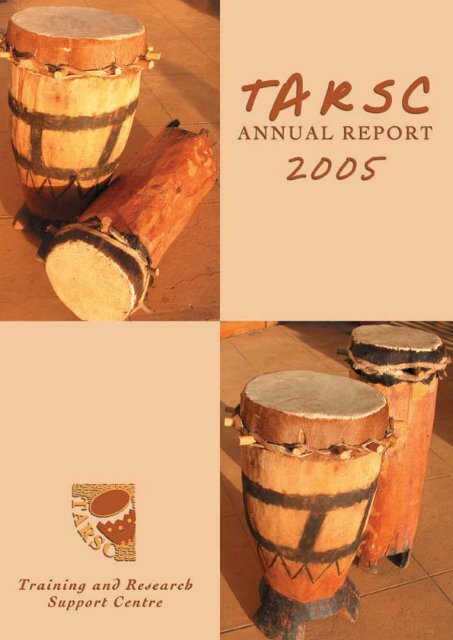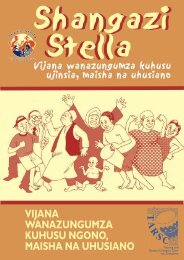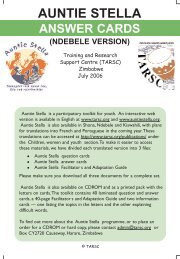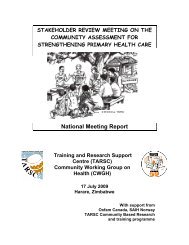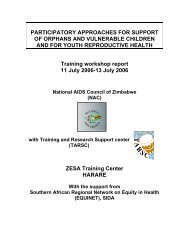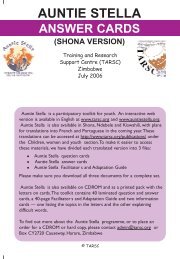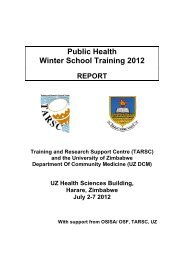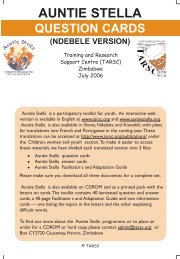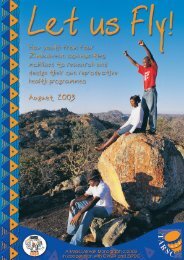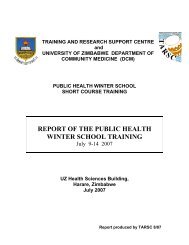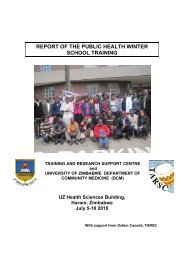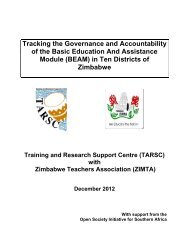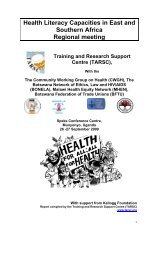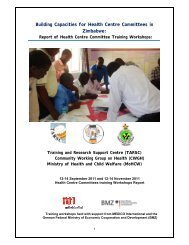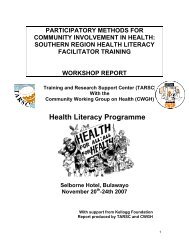TARSC Annual Report 2005 - Training and Research Support Centre
TARSC Annual Report 2005 - Training and Research Support Centre
TARSC Annual Report 2005 - Training and Research Support Centre
Create successful ePaper yourself
Turn your PDF publications into a flip-book with our unique Google optimized e-Paper software.
<strong>Training</strong> <strong>and</strong> <strong>Research</strong> <strong>Support</strong> <strong>Centre</strong> (<strong>TARSC</strong>)<br />
<strong>Annual</strong> <strong>Report</strong> <strong>2005</strong>
TABLE OF CONTENTS<br />
1. ABOUT US 3<br />
2. OUR WORK IN <strong>2005</strong> 6<br />
2.1: RESEARCH ACTIVITIES AND RESOURCES 6<br />
2.1.1 Participatory <strong>and</strong> community based research 6<br />
2.1.2 Community monitoring <strong>and</strong> sentinel surveillance 7<br />
2.1.3 Other research 8<br />
2.1.4 <strong>Research</strong> materials produced in <strong>2005</strong> 10<br />
2.2: CAPACITY BUILDING ACTIVITIES AND RESOURCES 11<br />
2.2.1 Capacity building activities 11<br />
2.2.2 Material Development for participatory research <strong>and</strong> training 14<br />
2.2.3 <strong>Training</strong> materials produced in <strong>2005</strong> 16<br />
2.3: INFORMATION RESOURCES 17<br />
<strong>TARSC</strong>, 47 Van Praagh Ave, Milton Park, Harare Zimbabwe<br />
Phone: +263-4- 708 835 / 705 108 / 725 194 Fax: +263-4-737 220<br />
Email: admin@tarsc.org Website: www.tarsc.org<br />
4
1. ABOUT US<br />
<strong>Training</strong> <strong>and</strong> <strong>Research</strong> <strong>Support</strong> <strong>Centre</strong> (<strong>TARSC</strong>) Zimbabwe is a non profit<br />
company registered in 1994 in terms of Sub-Section 4 of Section 13 of<br />
Statutory Instrument 178 of 1984 by the Minister of Justice, Legal <strong>and</strong><br />
Parliamentary Affairs in terms of Section 26 of the Companies Act (Chapter<br />
24;03). The full objectives of the company may be examined at the office<br />
of the Registrar of Companies, Electra House, Samora Machel Avenue,<br />
Harare.<br />
The principal objective of the organisation is to provide training, research<br />
<strong>and</strong> support services to develop social <strong>and</strong> organisational capacities within<br />
state <strong>and</strong> civil society organisations to interact on areas of social policy<br />
<strong>and</strong> social development.<br />
<strong>TARSC</strong> works towards these goals through<br />
• <strong>Research</strong>, particularly analytic <strong>and</strong> participatory research<br />
• Capacity building <strong>and</strong> mentoring in research methods, particularly<br />
participatory action research <strong>and</strong> community based research<br />
methods, to inform social <strong>and</strong> economic policy debates<br />
• Compilation, analysis <strong>and</strong> review of information on social <strong>and</strong><br />
economic development<br />
• <strong>Training</strong>, skills development <strong>and</strong> mentoring of organisations working<br />
in areas of social <strong>and</strong> economic development<br />
• Technical advisory services <strong>and</strong> support to networking <strong>and</strong> engagement between civil society, private<br />
sector <strong>and</strong> state on specific areas of social <strong>and</strong> economic policy. <strong>TARSC</strong> is a small organisation that<br />
works with other organisations <strong>and</strong> areas of expertise to fulfil its goals.<br />
<strong>TARSC</strong> provides technical support, mentoring, cadreship building <strong>and</strong> organizational development to a range of<br />
membership based civil society organizations, to organizations in the state, in local government <strong>and</strong> in<br />
parliament at local, national <strong>and</strong> international level. The work focuses on various dimensions of health <strong>and</strong><br />
social development outlined in more detail in the ten year review in the <strong>TARSC</strong> annual report for 2004. The<br />
organization has developed partnerships, materials <strong>and</strong> other resources towards this <strong>and</strong> has made its resources<br />
publicly available. <strong>TARSC</strong> is a learning <strong>and</strong> knowledge organization, with a particular focus on skills building<br />
<strong>and</strong> methods to support community based work, <strong>and</strong> with a commitment to long term national capacity<br />
building in the public sector <strong>and</strong> in civil society.<br />
Our organisational structure is shown overleaf. In late <strong>2005</strong>, the current directors, Dr Rene Loewenson<br />
<strong>and</strong> Dr Nikki Jazdowska, welcomed a new director to<br />
<strong>TARSC</strong>, Itai Rusike. Itai has had a long association<br />
working with <strong>TARSC</strong>, first as a research officer, then<br />
as a project officer with the Community Working<br />
Group on Health (CWGH). In 2003 Itai became the<br />
executive director of the CWGH when it became an<br />
independent trust. Itai has demonstrated throughout<br />
this time a shared commitment to the goals at <strong>TARSC</strong><br />
<strong>and</strong> a significant contribution towards these. <strong>TARSC</strong><br />
welcomed Itai formally at the launch of the new Auntie<br />
Stella pack <strong>and</strong> of <strong>TARSC</strong> materials on health in October <strong>2005</strong>.<br />
<strong>TARSC</strong> ANNUAL REPORT <strong>2005</strong><br />
5
Directors<br />
Policy Board<br />
General Manager<br />
Administration <strong>and</strong> Technical (2 posts)<br />
Overall management responsibility for the<br />
organisation <strong>and</strong> for delivery on its goals <strong>and</strong><br />
responsibilities<br />
Policy Advisory Body<br />
Provides the Directors <strong>and</strong> General<br />
Manager with advice <strong>and</strong> guidance on<br />
the key goals, institutional <strong>and</strong><br />
programme developments <strong>and</strong><br />
organisational frameworks for <strong>TARSC</strong><br />
Finance Unit<br />
Financial management<br />
services<br />
• Finance manager<br />
• Bookeeper<br />
• Accounting<br />
• Audit<br />
Administration<br />
Unit<br />
Administration services<br />
• Admin secretary<br />
• Messenger<br />
• Legal,<br />
• Cleaner Gardener<br />
<strong>and</strong> security<br />
services<br />
Technical Unit<br />
Technical programmes & services<br />
• Community based <strong>and</strong><br />
participatory research<br />
• Community monitoring<br />
• General <strong>Research</strong><br />
• Sectoral skills training<br />
• <strong>Research</strong> skills training<br />
• Material development<br />
• Information resource centre<br />
• Web, IT <strong>and</strong> publications<br />
In addition to the directors named above, personnel working directly on <strong>TARSC</strong> programmes include<br />
• The General manager (Administration):<br />
Zvikomborero Mlambo<br />
• Project managers, consultants, researchers:<br />
Barbara Kaim, Rose Tindwa, Thomas<br />
Chikumbirike, Godfrey Musuka,<br />
Elizabeth Shoko, Faith Chikomo, Naira Khan<br />
• Library, information <strong>and</strong> secretarial: Mevice<br />
Mak<strong>and</strong>wa<br />
• Bookkeeper: Jacob Chakupwaza<br />
• Office clerk/ messenger: Francis Chakupwaza<br />
6
Our work is documented in a range of research reports, training<br />
materials <strong>and</strong> other documents, with over 700 documents that<br />
we have directly produced available in our library <strong>and</strong> a website<br />
(at www.tarsc.org), where we provide information on our<br />
ongoing work, access to <strong>TARSC</strong> publications <strong>and</strong> to resources<br />
for work on health <strong>and</strong> social development.<br />
In October <strong>2005</strong> we held an evening event that was a ‘thank<br />
you’ to our many partners over the last 10 years. We used the<br />
opportunity to launch our new ‘Auntie Stella’ training materials<br />
<strong>and</strong> to present the range of <strong>TARSC</strong> research <strong>and</strong> training<br />
materials that have been produced.<br />
Any activity in the organization is an outcome of the combined<br />
inputs of the technical, administration <strong>and</strong> finance departments.<br />
The administration unit provides a conducive workplace,<br />
functional communications systems, supplies, copying, printing<br />
<strong>and</strong> other inputs. The administrative staff have supported the<br />
viability of the organisation under difficult economic conditions.<br />
There is a spirit of togetherness <strong>and</strong> mutual respect among the<br />
personnel in all departments for the role they each play. <strong>TARSC</strong> personnel have continued to deepen their own<br />
capacities through formal training <strong>and</strong> through in-service mentoring. In <strong>2005</strong> <strong>TARSC</strong> personnel pursued formal<br />
training in personnel management, business administration <strong>and</strong> accounting <strong>and</strong> skills workshops in a range of<br />
technical areas.<br />
In our work we formally co-operate with a range of individuals <strong>and</strong> institutions in various areas of work, too<br />
many to mention all! We give specific mention to these in the various theme areas of this report. Our<br />
partnerships include University <strong>and</strong> civil society trainers <strong>and</strong> researchers, web site support through Fahamu <strong>and</strong><br />
publications support through Designmark <strong>and</strong> Blue Apple Design. The centre contracts legal services, an<br />
auditor, computer, edit <strong>and</strong> printing services. <strong>TARSC</strong> accounting uses ACCPAC, an internationally recognised<br />
accounting package <strong>and</strong> finances are governed by a finance procedures manual reviewed annually. The <strong>TARSC</strong><br />
(Zimbabwe) financial year is July 1-June 30 <strong>and</strong> audit statements have been prepared for the financial year<br />
ending June 30 <strong>2005</strong>, audited by Ziumbe <strong>and</strong> Co.<br />
The policy advisory committee in <strong>TARSC</strong> comprised I Rusike (prior to his appointment as director in late <strong>2005</strong>),<br />
M Mushayabasa, Dr G Kanyenze, Prof Y T<strong>and</strong>on, Prof G Woelk, W Chikuvanyanga. The advisory body met once<br />
in <strong>2005</strong> to review ongoing implementation of the areas of programme focus put forward in 2004, was<br />
consulted in various issues through the year <strong>and</strong> participated in the <strong>TARSC</strong> materials launch in October <strong>2005</strong>.<br />
This section has outlined our institutional goals, structure <strong>and</strong> how we work.<br />
In the next section we outline our major areas of work in <strong>2005</strong>, within the areas of:<br />
• <strong>Research</strong> activities <strong>and</strong> resources<br />
• Capacity building activities <strong>and</strong> resources<br />
• Information resources<br />
We recognise the massive challenges to economic <strong>and</strong> social justice that still need to be<br />
faced in Zimbabwe. In <strong>TARSC</strong> we seek to support the knowledge, analysis <strong>and</strong> capacity<br />
within communities <strong>and</strong> in the public sector to respond to these challenges at all levels,<br />
towards building a just <strong>and</strong> equitable society.<br />
<strong>TARSC</strong> ANNUAL REPORT <strong>2005</strong><br />
7
2. OUR WORK IN <strong>2005</strong><br />
This report outlines the major areas of <strong>TARSC</strong> work in <strong>2005</strong>. More detailed reports of the work are available<br />
from <strong>TARSC</strong> <strong>and</strong> training <strong>and</strong> research resources are available from the <strong>TARSC</strong> website (www.tarsc.org)<br />
2.1: <strong>Research</strong> activities <strong>and</strong> resources<br />
The work we do is organised within three main areas:<br />
• Participatory <strong>and</strong> community based research<br />
• Community monitoring <strong>and</strong> sentinel surveillance<br />
• General research<br />
Our research programmes have involved technical inputs in <strong>TARSC</strong> from (alphabetically) Thomas Chikumbirike,<br />
Barbara Kaim, Rene Loewenson, Godfrey Musuka, Elizabeth Shoko <strong>and</strong> Rose Tindwa. We have worked in these<br />
programmes with consultant inputs <strong>and</strong> with a range of institutions <strong>and</strong> personnel from those institutions,<br />
noted in the reports.<br />
2.1.1 Participatory <strong>and</strong> community based research<br />
Since its inception in 1994, participatory action research has been the cornerstone of much of the work<br />
undertaken by <strong>TARSC</strong>. Drawing on our experiences <strong>and</strong> skills in the use of participatory methodologies, we<br />
have worked with numerous community based organizations <strong>and</strong> social groups to incorporate their knowledge<br />
<strong>and</strong> abilities in the development of programmes <strong>and</strong> training materials in specific areas. Our participatory<br />
research has covered areas of child sexual abuse, workplace health, community perceptions of health priorities,<br />
local government <strong>and</strong> community roles <strong>and</strong> health, <strong>and</strong> participatory mechanisms for community involvement<br />
in health. The Adolescent Reproductive Health Programme (ARHeP) at <strong>TARSC</strong> trained youth in four<br />
community-based organizations in Matabelel<strong>and</strong> to undertake research on the reproductive health needs of<br />
youth, <strong>and</strong> this work was used to provide materials on how to involve youth in their own reproductive health<br />
programmes.<br />
In <strong>2005</strong> the Community Monitoring<br />
Programme (see later) built on work<br />
implemented to build research skills in<br />
the CWGH to measure costs of a<br />
‘health basket’, ie to carry out basic<br />
research on costs of drugs <strong>and</strong> medical<br />
care <strong>and</strong> how people are responding<br />
to these costs. <strong>Support</strong>ed by <strong>TARSC</strong><br />
<strong>and</strong> CWGH, Thomas Chikumbirike,<br />
Elizabeth Shoko at <strong>TARSC</strong> with CWGH<br />
personnel provided training to a<br />
further 15 CWGH districts <strong>and</strong> carried<br />
out a second ‘costs of health’ survey in<br />
July <strong>2005</strong>. A second round of training<br />
was provided to give skills in basic<br />
statistical analysis <strong>and</strong> a national<br />
report was circulated in September<br />
<strong>2005</strong>. The costs of health survey will<br />
be repeated in 2006 to provide an<br />
annual trend analysis.<br />
8
Community based research on the cost of the ‘health basket’ with CWGH <strong>and</strong> the<br />
Community Monitoring Project<br />
The CWGH eleventh national meeting resolved that the CWGH co-operate with the CMP <strong>and</strong> <strong>TARSC</strong> to outline<br />
<strong>and</strong> measure the costs of a ‘health basket’ similar to the CCZ food basket, to make visible the costs of<br />
maintaining health for different Zimbabwean households. The research aimed to identify the composition of<br />
the health basket, (Eg: shelter, food <strong>and</strong> safe water, clothing, proper sanitation, safety <strong>and</strong> security <strong>and</strong> health<br />
care), identify the changing costs of medical care for different care providers <strong>and</strong> communities to assess the<br />
main elements that are driving up the cost of medical care, <strong>and</strong> build skills in research <strong>and</strong> survey methods<br />
<strong>and</strong> work, in managing data <strong>and</strong> in reporting <strong>and</strong> using findings amongst district level CWGH members, <strong>and</strong><br />
use the reports to take up issues around these costs as CWGH in discussions with MPs, councilors, health<br />
authorities <strong>and</strong> officials at district <strong>and</strong> national level.<br />
The findings of this second round of the health basket research were not very different from those of the first<br />
round. Food, soap <strong>and</strong> shelter continued to dominate as the highest cost drivers compared to medical care. As<br />
in the first round, poor households showed signs of cost stress as the same items food, reproductive health<br />
<strong>and</strong> hygiene items were being dropped from the health basket without any mention of suitable substitutes.<br />
The nominal cost to the household for the health basket for one month found in this second round was<br />
Z$1 916 262 an increase of over 87% compared to the Z$1 023 386 found in the first round in October 2004.<br />
Source: CWGH, <strong>TARSC</strong> <strong>and</strong> CMP (<strong>2005</strong>)<br />
2.1.2 Community monitoring <strong>and</strong> sentinel surveillance<br />
<strong>TARSC</strong> work on sentinel surveillance activities in the past is outlined in its 2004 report. In <strong>2005</strong>, <strong>TARSC</strong><br />
continued to provide technical support to the Community Monitoring Programme with guidance from a<br />
steering committee of civil society organisations working in social <strong>and</strong> economic sectors, who are responsible<br />
for producing the reports.<br />
The Community Monitoring Programme compiles quarterly information from about 160 sentinel sites on key<br />
areas of social <strong>and</strong> economic progress. The monitoring system is subjected to scientific <strong>and</strong> peer review in<br />
various technical platforms <strong>and</strong> to monitor review. In <strong>2005</strong> the Community Monitoring Programme provided<br />
quarterly reporting of key social <strong>and</strong> economic conditions at community level, ie in April <strong>2005</strong> on health <strong>and</strong><br />
education; in July <strong>2005</strong> on incomes <strong>and</strong><br />
employment; September <strong>2005</strong> on food <strong>and</strong><br />
production. The reports are disseminated<br />
nationally, including to the relevant portfolio<br />
committees of the parliament of Zimbabwe.<br />
<strong>TARSC</strong> ANNUAL REPORT <strong>2005</strong><br />
9
2.1.3 Other research<br />
While the major focus of research has been community based <strong>and</strong> participatory research, <strong>TARSC</strong> has also<br />
implemented <strong>and</strong> reported on a number of other formal research activities in 2004, adding to a research<br />
portfolio in occupational health, public health, HIV <strong>and</strong> AIDS, health equity, social security, food security <strong>and</strong><br />
nutrition, gender equity, child <strong>and</strong> adolescent health <strong>and</strong> social development, reproductive health <strong>and</strong> various<br />
areas of social <strong>and</strong> economic progress.<br />
The Network for Equity in Health in Southern Africa (EQUINET) is<br />
dedicated to influencing both national <strong>and</strong> regional policies of the countries<br />
of the Southern Africa Development Community (SADC) to ensure equity in<br />
health. It does so by networking professionals, civil society <strong>and</strong> policy<br />
makers to promote policies for equity in health, undertaking research,<br />
initiating conferences, workshops, <strong>and</strong> discussions through the internet, <strong>and</strong><br />
providing inputs at the SADC forums. Equinet was initiated in 1997 after<br />
the Kasane Meeting on Equity in Health in southern Africa by a network of<br />
southern African Institutions. EQUINET is a consortium of a much larger<br />
number of institutions <strong>and</strong> its work programme extends well beyond <strong>TARSC</strong><br />
activities. <strong>TARSC</strong> provides secretariat <strong>and</strong> technical support to the network<br />
through Rene Loewenson, Godfrey Musuka <strong>and</strong> Zvikomborera Mlambo.<br />
Further information on the network <strong>and</strong> its participating institutions <strong>and</strong><br />
supporting partners in specific areas of work can be found at<br />
www.equinetafrica.org.<br />
EQUINET has implemented research in areas where evidence is needed to support equitable public policy <strong>and</strong><br />
where debate exists on paths to improving health equity. Consultation across work programmes, with various<br />
constituencies affirmed the commitment to shared values of equity, social justice <strong>and</strong> to the right to health.<br />
The EQUINET programme as a whole is proactive <strong>and</strong> affirmative, to build the health systems that deliver on<br />
these values in our region. Across EQUINET, the ‘reclaiming the state’ agenda defined at the conference in June<br />
2004 was explored. The network reached a consensus on <strong>2005</strong> that with the current challenges <strong>and</strong> conditions<br />
in the region, the priority that this implies is to revitalise <strong>and</strong> build national peoples’ health systems so that we<br />
have publicly-funded comprehensive, people centred <strong>and</strong> people driven equitable <strong>and</strong> universal health systems.<br />
The April <strong>2005</strong> EQUINET Steering committee meeting held in Johannesburg, South Africa reviewed, debated<br />
<strong>and</strong> identified these major goals, perspectives <strong>and</strong> areas of work on equity <strong>and</strong> social justice in health, drawing<br />
also on the resolutions of a meeting for fourteen major networks of health civil society held in February <strong>2005</strong><br />
in Zambia that raised civil society priorities for regional work in health. The April <strong>2005</strong> meeting proposed two<br />
areas of follow up to take these priorities forward.<br />
Towards this EQUINET held in October <strong>2005</strong> in Harare, Zimbabwe a regional review meeting that brought<br />
together steering committee members; theme, process <strong>and</strong> country co-ordinators; colleagues working in key<br />
areas of work central to EQUINET’s agenda; <strong>and</strong> civil society colleagues. The meeting reviewed EQUINET current<br />
work to shape <strong>and</strong> critically debate the form <strong>and</strong> content for the annual equity analysis at regional (<strong>and</strong><br />
country) level. In line with the shared framework above, the October steering committee meeting reviewed<br />
the work of themes <strong>and</strong> processes in the network <strong>and</strong> identified a more detailed spectrum of messages arising<br />
from existing work around which the evidence, knowledge, debates <strong>and</strong> engagement on the equity analysis<br />
can be organised. This is contained in the full report of the meeting available on the EQUINET website.<br />
(www.equinetafrica,org).<br />
10
EQUINET through CHESSORE <strong>and</strong> <strong>TARSC</strong> has been carrying out work on participatory mechanisms at primary<br />
care <strong>and</strong> district level, <strong>and</strong> their role in equitable resource allocation <strong>and</strong> service provision. In 2003/4 three<br />
field studies <strong>and</strong> a substantive literature review were implemented, <strong>and</strong> the work reported back <strong>and</strong> used at<br />
national level to review participatory mechanisms <strong>and</strong> at regional level to synthesise knowledge on towards<br />
policy intervention <strong>and</strong> training on participatory mechanisms for local government <strong>and</strong> health authorities.<br />
This work was reported at the Forum 9 of the Global Health <strong>Research</strong> Forum in Mumbai, India, 12-16<br />
September <strong>2005</strong> (Rene Loewenson, Itai Rusike <strong>and</strong> Memory Zulu).<br />
Following the end of fieldwork activities, in January <strong>2005</strong> CHESSORE <strong>and</strong> <strong>TARSC</strong> hosted a participatory<br />
workshop in Kafue Gorge, Zambia that presented the field work <strong>and</strong> similar work from East <strong>and</strong> Southern<br />
Africa. This meeting is separately reported at www.equinetafrica.org.<br />
In <strong>2005</strong> REACH Trust with the equity task force in the Ministry of Health Malawi with support from <strong>TARSC</strong><br />
carried out a study to apply the framework for monitoring in Malawi collating data up to 2004 using<br />
indicators developed at the regional meeting (see www.equinetafrica.org). With this practical example dialogue<br />
was established with WHO to implement this work on a wider scale with support from WHO EIP <strong>and</strong> WHO<br />
AFRO.<br />
We have implemented other research support to EQUINET: <strong>TARSC</strong> has worked with the parliamentary<br />
committee on health to support both research <strong>and</strong> capacity inputs in various areas of health equity, adolescent<br />
health <strong>and</strong> HIV <strong>and</strong> AIDS. In <strong>2005</strong> <strong>TARSC</strong> working within EQUINET <strong>and</strong> with the Global Equity Gauge Alliance<br />
continued to provide this support.<br />
In <strong>2005</strong> we have continued to implement a scheme to provide small grant support to student research in areas<br />
of equity in health, with six grants awarded in the region in <strong>2005</strong>. The EQUINET programme officer at <strong>TARSC</strong><br />
also carried out a study of ‘Career Plans of Parts III <strong>and</strong> IV Medical Students at the University of Zimbabwe<br />
College of Health Sciences’ <strong>and</strong> went on a study visit to the National Institute of Public Health Sweden to<br />
review the process of parliamentary engagement on health in Sweden <strong>and</strong> lessons for the region.<br />
<strong>TARSC</strong> through EQUINET has also provided technical <strong>and</strong> networking support to the <strong>Centre</strong> for Health Policy in<br />
South Africa which is the hub for the knowledge network on health systems in the WHO Commission on the<br />
Social Determinants of Health, as well as to the African Health <strong>Research</strong> Forum <strong>and</strong> the Municipal Services<br />
Project, South Africa.<br />
<strong>TARSC</strong> ANNUAL REPORT <strong>2005</strong><br />
11
2.1.4 <strong>Research</strong> materials produced in <strong>2005</strong><br />
1. <strong>TARSC</strong> , CWGH (<strong>2005</strong>) <strong>Report</strong> on the Evaluation of the Civic Health Education Programme. Study<br />
commissioned by the CWGH. August <strong>2005</strong>. Harare, Zimbabwe<br />
2. EQUINET, <strong>TARSC</strong>, CHESSORE (<strong>2005</strong>) Abstract book: Strengthening community voice <strong>and</strong> agency in<br />
health, Zambia, 26-28 January <strong>2005</strong><br />
3. EQUINET, <strong>TARSC</strong>, CHESSORE (<strong>2005</strong>) Meeting <strong>Report</strong>: Strengthening community voice <strong>and</strong> agency in<br />
health, Zambia, 26-28 January <strong>2005</strong><br />
4. CHP/ SEATINI/ <strong>TARSC</strong> (<strong>2005</strong>) EQUINET Regional Workshop <strong>Report</strong>: Promoting health in Trade<br />
Agreements, Johannesburg – South Africa, 29 October <strong>2005</strong><br />
5. Kokerai T et al (<strong>2005</strong>):Protecting Rights of Access to Anti-Retroviral Therapy (ART) Under Trade <strong>and</strong><br />
Market Policies: The Zimbabwean Case, draft country-level audit. EQUINET programme ‘Promoting<br />
Health in Trade Agreements’ Mimeo<br />
6. Makwiza I; Nyirenda L; Bongololo G; Loewenson R, Theobald S, (<strong>2005</strong>) ‘EQUINET Discussion Paper 24:<br />
Monitoring equity <strong>and</strong> health systems in the provision of Antiretroviral Therapy (ART): Malawi Country<br />
report’, www.equinetafrica.org<br />
7. EQUINET, REACH Trust, World Health Organisation (WHO) (<strong>2005</strong>) “Monitoring equity in ART provision in<br />
the context of health systems,” <strong>Report</strong> of a meeting held in Lilongwe, Malawi, 29-30 August <strong>2005</strong><br />
8. Loewenson R, Rusike I, Zulu M (<strong>2005</strong>) “The impact of Health <strong>Centre</strong> Committees on health outcomes in<br />
Zimbabwe,” Plenary paper presented at Global Forum for Health <strong>Research</strong>, Forum 9: Poverty, equity <strong>and</strong><br />
health research Conference, Mumbai India, 12-16 September <strong>2005</strong>.<br />
9. EQUINET Steering Committee/ <strong>TARSC</strong> (<strong>2005</strong>) “A common agenda for equity in health in east <strong>and</strong><br />
southern Africa,” <strong>Report</strong> of a regional review meeting held in Harare, 10-12 October <strong>2005</strong>.<br />
10. Health Civil Society network / <strong>TARSC</strong> (<strong>2005</strong>) “Meeting of health civil society in east <strong>and</strong> southern Africa<br />
at the Southern African Social Forum (SASF),” <strong>Report</strong> of a meeting held in Harare, 13 October <strong>2005</strong>.<br />
11. EQUINET, SEATINI, <strong>Centre</strong> for Health Policy (University of Witwatersr<strong>and</strong>) (<strong>2005</strong>) “Promoting health in<br />
trade agreements,” <strong>Report</strong> of the regional review meeting held in Johannesburg, 29 October <strong>2005</strong>.<br />
12. <strong>TARSC</strong>, CWGH <strong>and</strong> CMP (<strong>2005</strong>) <strong>Research</strong> training workshop report, Harare, February <strong>2005</strong><br />
13. Loewenson R, Chikumbirike T (<strong>2005</strong>) Community based monitoring <strong>and</strong> research on food security <strong>and</strong><br />
social welfare, “Paper for the SARPN meeting”, South Africa, May <strong>2005</strong><br />
14. <strong>TARSC</strong>, CWGH <strong>and</strong> CMP (<strong>2005</strong>) Meeting the cost of health: research data workbook , July <strong>2005</strong><br />
15. <strong>TARSC</strong>, CWGH <strong>and</strong> CMP (<strong>2005</strong>) The cost of health: a community research report, July <strong>2005</strong><br />
16. <strong>TARSC</strong>, CWGH <strong>and</strong> CMP (<strong>2005</strong>) <strong>Research</strong> training workshop report, Harare, August <strong>2005</strong><br />
17. Community Monitoring Programme (<strong>2005</strong>) Quarterly community assessment of the socio-economic<br />
situation in Zimbabwe: health <strong>and</strong> education, March <strong>2005</strong><br />
18. Community Monitoring Programme (<strong>2005</strong>) Quarterly community assessment of the socio-economic<br />
situation in Zimbabwe: income <strong>and</strong> employment, June/July <strong>2005</strong><br />
19. Community Monitoring Programme (<strong>2005</strong>) Quarterly community assessment of the socio-economic<br />
situation in Zimbabwe: food security <strong>and</strong> production, September <strong>2005</strong><br />
20. Musuka G (<strong>2005</strong>) Descriptive study of debates on health equity matters in the Zimbabwe National<br />
Legislative Assembly. <strong>Research</strong> paper, <strong>TARSC</strong> Mimeo, Harare<br />
21. Musuka G (<strong>2005</strong>) The Swedish Parliamentary Social Committee (Socialutskottet) <strong>and</strong> its engagement<br />
with stakeholders on health issues, Mimeo, <strong>TARSC</strong>, Harare.<br />
22. <strong>TARSC</strong>, EQUINET SC (<strong>2005</strong>) <strong>Report</strong> of the steering committee meeting, April <strong>2005</strong>, South Africa, Mimeo<br />
12
2.2: Capacity building activities <strong>and</strong> resources<br />
Our capacity building activities are reported within three main areas:<br />
• <strong>Training</strong> <strong>and</strong> skills building programmes<br />
• Material development<br />
Our capacity building programmes have involved technical inputs in <strong>TARSC</strong> from (alphabetically) Thomas<br />
Chikumbirike, Niki Jazdowska, Barbara Kaim, Rene Loewenson, Zvikie Mlambo, Godfrey Musuka, Elizabeth<br />
Shoko <strong>and</strong>, Rose Tindwa. Consultant <strong>and</strong> institutional inputs have been provided by a range of institutions<br />
identified within specific programme areas.<br />
2.2.1 Capacity building activities<br />
<strong>TARSC</strong> has since 1999 been involved with capacity development for young people in adolescent reproductive<br />
health. As outlined in the 2004 report, <strong>TARSC</strong> has supported youth skills building in leadership<br />
skills, HIV/AIDS & STIs, report writing, participatory action research <strong>and</strong> participatory<br />
monitoring <strong>and</strong> evaluation. In 2003 <strong>TARSC</strong> consolidated this programme through a<br />
memor<strong>and</strong>um of co-operation with CWGH to provide capacity support through an<br />
umbrella CWGH youth programme <strong>and</strong> has since then provided technical support to<br />
the CWGH youth programme with the aim of strengthening youth participation in<br />
reproductive health <strong>and</strong> wider health programmes in their communities. Strategic<br />
planning <strong>and</strong> review meetings held in 2004 identified areas for follow up in <strong>2005</strong>.<br />
In <strong>2005</strong>, the programme focused on training in primary health care, adolescent<br />
reproductive health <strong>and</strong> HIV, AIDS <strong>and</strong> STIs, with continued support in basic peer counseling<br />
skills to enable them to counsel their peers in these matters. With <strong>TARSC</strong> support for content inputs, <strong>and</strong><br />
CWGH co-ordinating, four Primary Health Care (PHC) <strong>and</strong> peer counseling (PC) youth workshops were held,<br />
each over five days in Hwange, Bulawayo, Insiza, Chikwaka <strong>and</strong> Umzingwane, covering 168 participants.<br />
<strong>TARSC</strong> provided capacity building <strong>and</strong> technical support to the CWGH youth programme. <strong>TARSC</strong> supported<br />
CWGH in the process of hiring a CWGH Youth Programme Manager, <strong>and</strong> provided orientation <strong>and</strong> support to<br />
the newly hired Youth Programme Manager.<br />
As a new innovation on the programme <strong>TARSC</strong> in <strong>2005</strong> developed with support from SAIH youth skills training<br />
in savings <strong>and</strong> entrepreneurial skills. The programme was introduced in response to request for economic<br />
empowerment by participating youths as reflected by their participatory Action <strong>Research</strong> reports <strong>and</strong> the 2004<br />
Strategic Plan. The methodology was piloted through the CWGH youth programme in two communities - in<br />
youth in Arcturus <strong>and</strong> adults in Chikwaka.<br />
In <strong>2005</strong>, <strong>TARSC</strong> implemented the programme with the CWGH. In the subsequent outreach by CWGH the work<br />
amongst youth did not lead to concrete groups being formed, while it did in adults in both Chikwaka <strong>and</strong><br />
Arcturus. <strong>Support</strong> from CWGH trainers <strong>and</strong> from within the community is now taking place to sustain these<br />
groups. <strong>TARSC</strong> is documenting, following up <strong>and</strong> learning through the activities of CWGH on how these groups<br />
are functioning to improve the training in this method. For example, one group in Chikwaka<br />
plans to divide all the funds they saved this year in January 2006 to pay for school fees in<br />
the New Year. These examples will enrich the training materials <strong>and</strong> provide a basis for<br />
horizontal sharing of learning. The experience has also indicated that there needs to be a<br />
minimum cohesion amongst groups for this process to ‘work’, <strong>and</strong> it is suggested that<br />
future training be directed at groups with longer term cohesion, such as youth groups<br />
with a longer history of working together, or youth working with other adults in the<br />
community. A training manual for the methodology is being adapted by <strong>TARSC</strong> in cooperation<br />
with CARE International.<br />
<strong>TARSC</strong> ANNUAL REPORT <strong>2005</strong><br />
13
The savings methodology<br />
The savings methodology is a simple self managed micro-finance model that empowers poor people to<br />
improve their livelihood security. It rests on the premise that low income households face constraints that<br />
prevent them from engaging in economic activities, which would help build the resilience of the household<br />
safety net. In response to this affording poor households access to timely <strong>and</strong> flexible loans is identified as a<br />
means to improving economic resiliency.<br />
Developed in Niger, it has been adapted within a few countries in Africa including Zimbabwe <strong>and</strong> applies in<br />
contexts where there is limited access to capital or financial services in forms that meet the financial needs of<br />
households <strong>and</strong> limited outreach by financial services providers. While other work in <strong>TARSC</strong> such as the<br />
Community Monitoring Programme raises wider issues of access to credit, this methodology provides a means<br />
for self determination on earnings, savings <strong>and</strong> lending at a collective level, to build social ownership <strong>and</strong><br />
enhance scale <strong>and</strong> sustainability. Hence in the context of wider structural <strong>and</strong> distributional interventions aimed<br />
at access to credit, this method strengthens community cohesion across groups that build shared savings.<br />
The approach, carried out with CWGH in <strong>2005</strong>, aims to build underst<strong>and</strong>ing of <strong>and</strong> capacities in the method<br />
within organisations that have outreach, so that they are able to identify the most appropriate application<br />
<strong>and</strong> to deliver the methodology on their own. This involve exposure trips; one week training of staff in the<br />
methodology using participatory approaches, supported <strong>and</strong> mentored training of community groups. The<br />
organisations once trained take forward the follow up community activities.<br />
<strong>TARSC</strong> was involved in developing the facilitators skills <strong>and</strong> materials for the first civic education programme<br />
on health for the CWGH in 1998. We were approached in <strong>2005</strong> by CWGH to support their updating the<br />
programme of training <strong>and</strong> to develop new materials to reflect the new needs of the programme. To take this<br />
forward, <strong>TARSC</strong> in cooperation with CWGH, undertook an evaluation of the CWGH Civic Health Education<br />
Programme. The evaluation was implemented by Rene Loewenson, Elizabeth Shoko <strong>and</strong> Barbara Kaim (<strong>TARSC</strong>)<br />
<strong>and</strong> Itai Rusike <strong>and</strong> Linda Mashingaidze (CWGH). The evaluation carried out key informant interviews with<br />
CWGH at all levels, with Ministry of health <strong>and</strong> other health providers <strong>and</strong> with other CWGH partners.<br />
The evaluation report was completed in August 2006. In terms of past performance the programme was<br />
judged to have generally had a positive impact <strong>and</strong> broadly achieved its major objectives. The findings<br />
highlighted the strengths of the programme, including the ownership of the programme especially at district<br />
level, good use of participatory methodologies, approaches <strong>and</strong> content that address organizational issues <strong>and</strong><br />
goals of CWGH, amonst others. In terms of weaknesses, interviewees pointed to the need to update the<br />
material, to provide better ongoing support to facilitators, <strong>and</strong> to better orient materials to needs of<br />
community levels <strong>and</strong> national level CWGH (as distinct to district levels). The evaluation report was tabled at a<br />
meeting of the CWGH Information <strong>and</strong> <strong>Research</strong> Committee who endorsed the findings <strong>and</strong> recommended cooperation<br />
with <strong>TARSC</strong> in 2006 for the development of the updated programme <strong>and</strong> material using the<br />
findings. A programme is being developed with CWGH for this.<br />
<strong>TARSC</strong> <strong>and</strong> CWGH are also working with the network of health civil society in EQUINET <strong>and</strong> the Health civil<br />
society network in East <strong>and</strong> Southern Africa, particularly Malawi Health Equity network, HEPS Ug<strong>and</strong>a <strong>and</strong><br />
TANGO Tanzania to share <strong>and</strong> further develop health literacy programmes in the region. This will draw from<br />
the priorities expressed by EQUINET <strong>and</strong> the health civil society network for a national, people centred health<br />
system. This work will also be taken forward in 2006.<br />
14
In 2004 EQUINET through the Southern <strong>and</strong> East African Trade <strong>and</strong><br />
Investment Negotiation Institute (SEATINI) initiated a programme of work to<br />
analyse trade agreements relevant to public health (particularly GATS, TRIPS<br />
<strong>and</strong> agreements relating to food security) <strong>and</strong> raised policy dialogue on these<br />
at state, parliamentary, SADC <strong>and</strong> civil society forums. This work is being<br />
used in <strong>2005</strong> to pilot a capacity building programme <strong>and</strong> training materials<br />
on trade <strong>and</strong> investment <strong>and</strong> health systems for countries in southern <strong>and</strong><br />
East Africa, involving also the <strong>Centre</strong> for Health Policy (South Africa) <strong>and</strong> with support from the EQUINET<br />
secretariat at <strong>TARSC</strong>. The training provides capacities for national assessments of trade <strong>and</strong> investment policies<br />
for their impact on commercialisation of health systems to identify areas for policy, research <strong>and</strong> negotiation.<br />
The programme was initiated with the development of training materials by SEATINI, CHP<br />
<strong>and</strong> <strong>TARSC</strong>. The materials covered an introduction to trade <strong>and</strong> health systems, issues<br />
related to the commercialization of health systems, an introduction to the world Trade<br />
Organisation <strong>and</strong> the GATS <strong>and</strong> TRIPS agreements, <strong>and</strong> sections on policy analysis <strong>and</strong> a<br />
framework for auditing health <strong>and</strong> trade links at country level. The draft materials were<br />
peer reviewed <strong>and</strong> redrafted to be pilot tested in the workshops.<br />
Workshops were held in Tanzania <strong>and</strong> Zimbabwe using the materials <strong>and</strong> research<br />
implemented arising out of the training. <strong>TARSC</strong> has assisted in this follow up <strong>and</strong> in the regional workshop<br />
that reviewed the research <strong>and</strong> programme.<br />
CHP, SEATINI <strong>and</strong> <strong>TARSC</strong> are currently reviewing the training materials for final edit, publication <strong>and</strong> printing<br />
by EQUINET. An overall goal for the work is have a pool of skills with similar perspective on equity contributing<br />
to national policies on trade <strong>and</strong> health.<br />
In <strong>2005</strong> <strong>TARSC</strong>, through Naira Khan <strong>and</strong> Rene Loewenson worked with SANASO <strong>and</strong> SADC to provide<br />
guidelines on HIV <strong>and</strong> AIDS stigma reduction strategies for use by non-governmental organizations <strong>and</strong> the<br />
communities that they work with. The guidelines cover four thematic areas: Stigma <strong>and</strong> the family; in faith<br />
based organizations; in the workplace; <strong>and</strong> in the media. The guidelines were reviewed by a meeting of<br />
organisations working in these sectors convened by SANASO <strong>and</strong> by the SADC regional meeting of National<br />
AIDS Councils in Lesotho November <strong>2005</strong> <strong>and</strong> finalized with inputs from these meetings.<br />
In 2004, in response to expressed dem<strong>and</strong>, <strong>TARSC</strong> established a co-operation with the University of Zimbabwe<br />
Medical School to fill a gap in the provision of short course training to certificate level in areas of public<br />
health <strong>and</strong> health systems aimed at strengthening capabilities of field practitioners in public sector <strong>and</strong> civil<br />
society institutions working at district level. Such programmes are not unusual- ‘summer school’ public health<br />
training is offered through a number of institutions including in South Africa, Australia <strong>and</strong> Europe.<br />
The two institutions jointly piloted short course training in public health from 11-16 July <strong>2005</strong> at the College<br />
of Health Sciences, DCM Health Sciences building. <strong>TARSC</strong> personnel involved in planning, organizing <strong>and</strong><br />
acting as resource people for the course included Innocent Chingombe, Rene Loewenson, Zvikie Mlambo <strong>and</strong><br />
Godfrey Musuka, with lecture input from Barbara Kaim. A student on attachment to CWGH, A Makone also<br />
assisted in the course. The focal point from UZ were Professor Godfrey Woelk, Dr Chirenda <strong>and</strong> J January. The<br />
structure <strong>and</strong> content of the course was based on the findings from a needs <strong>and</strong> capacity assessment carried<br />
out by the two institutions to assess the training needs of the people at district level. The assessment indicated<br />
areas that people working at district level in Zimbabwe wanted included in short course training <strong>and</strong> the<br />
course was designed to respond to these priority needs.<br />
The course thus covered the following areas of public health <strong>and</strong> health systems:<br />
• Principles of public health <strong>and</strong> epidemiology<br />
• Major public health issues, including HIV <strong>and</strong> AIDS, TB, Malaria, nutrition<br />
• Elements of health systems, health financing, essential drug supplies <strong>and</strong> human resources for health<br />
• Zimbabwe’s health services at national, district <strong>and</strong> primary health care level<br />
• Community <strong>and</strong> non-health sector roles in health.<br />
<strong>TARSC</strong> ANNUAL REPORT <strong>2005</strong><br />
15
The course attracted delegates from public <strong>and</strong> private health providers, local government, parliament, nongovernment<br />
<strong>and</strong> community based organisations <strong>and</strong> research institutions. Resource people provided inputs<br />
from Ministry of Health, University, Non government organisations <strong>and</strong> from the two host institutions. The<br />
course was over subscribed <strong>and</strong> the evaluation indicated that it was well received. On the basis of a post<br />
course evaluation, <strong>TARSC</strong> <strong>and</strong> DCM plan to carry out a further basic course in 2006 <strong>and</strong> a second stage<br />
advanced course for those who completed the basic course in <strong>2005</strong>. The feedback from the evaluation will be<br />
used to further improve the course in 2006.<br />
2.2.2 Development of Materials for participatory research <strong>and</strong> training<br />
<strong>TARSC</strong> has through its programmes developed a range of research <strong>and</strong> training materials such as the level one<br />
research training course, the leadership training materials for organisational development, materials for youth<br />
peer counsellor training, <strong>and</strong> the materials used in the writing skills workshop. This builds on a portfolio of<br />
training materials developed since the early 1990s on civic education on health, on occupational health <strong>and</strong><br />
safety, HIV <strong>and</strong> AIDS at the workplace <strong>and</strong> social security. In <strong>2005</strong> <strong>TARSC</strong> will provide these training materials<br />
through its website for wider access <strong>and</strong> use.<br />
One major focus of <strong>TARSC</strong> work on material development in <strong>2005</strong> was the launching of the updated youth<br />
reproductive health pack, called ‘Auntie Stella: Teenagers talk about sex, life <strong>and</strong> relationships’ (Kaim <strong>2005</strong>).<br />
The work was implemented by Barbara Kaim, with Elizabeth Shoko, Zvikomborera Mlambo (<strong>TARSC</strong>), Caroline<br />
Mubaira <strong>and</strong> Nonjabulo Mahlangu of the CWGH Youth programme <strong>and</strong> in co-operation with government <strong>and</strong><br />
non government organisations in Africa from Zimbabwe, South Africa, Malawi, Zambia, Tanzania as well as<br />
internationally. This work was done with support from John Snow International (Europe), HIVOS, SAIH<br />
(Norway) <strong>and</strong> SIDA.<br />
A new version of Auntie Stella<br />
Auntie Stella, first produced in 1997, arose out of participatory action research with<br />
youth, drawing on <strong>and</strong> reflecting their experiences, stories <strong>and</strong> concerns in relation to<br />
their reproductive health. In 2004, <strong>TARSC</strong> began the process of updating the pack to take<br />
into account new developments in HIV <strong>and</strong> AIDS <strong>and</strong> lessons learnt in the use of the<br />
pack over the previous 7 years. As per the original pack, the development of the new<br />
version involved youth <strong>and</strong> youth-serving organizations in all stages of production. The<br />
pack reflects real life experiences of young people gathered through participatory research with in <strong>and</strong> out-ofschool<br />
youth. During pretesting in Zimbabwe, Malawi, South Africa, Tanzania <strong>and</strong> Zambia, youth contributed<br />
artwork, poems <strong>and</strong> proverbs which were incorporated into the final revisions of the pack.<br />
The new version includes 40 question <strong>and</strong> answer cards, written in the style of a missive to a newspaper agony<br />
aunt. Letters are accompanied by a reply from Auntie Stella, questions for small-group discussion <strong>and</strong> back-up<br />
material for teachers <strong>and</strong>/or facilitators. Topics covered include: physical <strong>and</strong> emotional changes in<br />
adolescence, relationships <strong>and</strong> communication with parents, peers, partners <strong>and</strong> the wider community, sexual<br />
abuse, social <strong>and</strong> economic pressures to have sex, safer sex including information on STIs, HIV <strong>and</strong> AIDS. The<br />
cards also emphasize the importance of building social networks <strong>and</strong> working to create a more supportive <strong>and</strong><br />
youth-friendly social environment through advocacy, collective action <strong>and</strong> involvement of community <strong>and</strong><br />
health services. (see www.tarsc.org <strong>and</strong> www.auntiestella.org).<br />
‘Auntie Stella’ was officially launched in Harare in October <strong>2005</strong>. The Shona <strong>and</strong> Ndebele versions of the pack<br />
will be available in January 2006. As the year drew to a close, <strong>TARSC</strong> in partnership with CWGH undertook two<br />
training workshops in Bulawayo <strong>and</strong> Harare on facilitation of ‘Auntie Stella’. Over 80 youth facilitators from 30<br />
organisations were trained.<br />
In 2006, we will give strong focus to building the capacity of implementing organizations in Zimbabwe <strong>and</strong> in<br />
east <strong>and</strong> southern Africa in the use of the ‘Auntie Stella’ pack . Distribution will be undertaken together with<br />
technical support in training of facilitators <strong>and</strong> monitoring of distribution <strong>and</strong> use. The Shona <strong>and</strong> Ndebele<br />
versions of the pack will also be distributed, with plans for translation of the pack into Kiswahili <strong>and</strong><br />
16
Portuguese in cooperation with organizations from<br />
Tanzania <strong>and</strong> Mozambique. <strong>TARSC</strong> will also be<br />
updating the Auntie Stella web version on the<br />
<strong>TARSC</strong> website (www.tarsc.org <strong>and</strong><br />
www.auntiestella.org) in the coming year.<br />
In 2004 <strong>TARSC</strong> established a co-operation with<br />
CHESSORE Zambia <strong>and</strong> the Ifakara Health <strong>Research</strong><br />
<strong>and</strong> Development <strong>Centre</strong> Tanzania to strengthen<br />
capacities in researchers, health system <strong>and</strong> civil<br />
society personnel working at community level to<br />
use participatory methodologies for research, training <strong>and</strong> programme support. <strong>TARSC</strong> <strong>and</strong> Ifakara, with peer<br />
review support from CHESSORE <strong>and</strong> support from EQUINET <strong>and</strong> IDRC Canada developed a toolkit of<br />
participatory methodologies for health research <strong>and</strong> training. This work was implemented by Rene Loewenson,<br />
Barbara Kaim <strong>and</strong> Faith Chikomo from <strong>TARSC</strong>, working with Selemani Mbuyita <strong>and</strong> A Makemba at Ifakara<br />
Tanzania <strong>and</strong> TJ Ngulube at CHESSORE Zambia.<br />
Participatory methods for a people centred health system<br />
The toolkit aims to strengthen capacities in researchers, health workers <strong>and</strong> civil society personnel working at<br />
community level to use participatory methods for research, training <strong>and</strong> programme support. We hope that the<br />
users of the toolkit will use participatory approaches within various areas of work aimed at building peoplecentred<br />
health systems. The toolkit uses experiences from different countries in the east <strong>and</strong> southern African<br />
region.<br />
Activity 4:<br />
TO IDENTIFY EXISTING SOCIAL GROUPS AND SHOW THEIR<br />
DISTRIBUTION ON A MAP. ON THE SAME MAP PARTICIPANTS WILL ALSO<br />
SHOW DISTRIBUTION OF WEALTH IN THEIR COMMUNITY.<br />
METHOD: COMMUNITY MAPPING<br />
Time: 60 – 80 minutes, depending<br />
on the number of people<br />
involved<br />
Material: On the ground –<br />
sticks, stones, leaves, etc<br />
On the floor – chalk or charcoal<br />
On paper – pencils, markers,<br />
crayons, pens<br />
The toolkit is divided into 7 modules. The earlier sections build underst<strong>and</strong>ing of what we mean by<br />
‘community’ ‘health’ <strong>and</strong> ‘health systems’. The later discuss how to build people-oriented health systems, what<br />
it means for the way health workers <strong>and</strong> communities interact, <strong>and</strong> for how communities are involved in their<br />
health systems. The last modules move from community <strong>and</strong> district levels to explore how communities are<br />
brought into national <strong>and</strong> global dialogue on health. Throughout the toolkit, informative text is interspersed<br />
with examples of how community voice can be raised through the use of participatory methods. There are over<br />
30 participatory activities in the toolkit, collectively using a wide range of methods including roleplay, picture<br />
codes, diagrams, ranking <strong>and</strong> scoring.<br />
<strong>TARSC</strong> ANNUAL REPORT <strong>2005</strong><br />
17
The toolkit was developed in <strong>2005</strong> <strong>and</strong> in March 2006 <strong>TARSC</strong> <strong>and</strong> Ifakara through EQUINET will be holding a<br />
four day workshop in Bagamoyo, Tanzania to train health workers, researchers, leaders <strong>and</strong> community<br />
organizations in participatory methods for strengthening community voice in health systems. The toolkit will<br />
form the basis of this workshop.<br />
In 2006 <strong>TARSC</strong> will continue to provide mentoring <strong>and</strong> capacity support nationally <strong>and</strong> within the region on<br />
use of PRA skills in health. We will document <strong>and</strong> disseminate publications on this, including through the<br />
<strong>TARSC</strong> website, <strong>and</strong> provide training on participatory methodologies for health. <strong>TARSC</strong> will further build its<br />
capacities to meet the dem<strong>and</strong>s it is facing in this area.<br />
2.2.3 <strong>Training</strong> materials produced in <strong>2005</strong><br />
1. Tindwa R (<strong>2005</strong>), The CWGH staff <strong>Training</strong> Of Trainers report on the Savings Methodology, May 6-13,<br />
23 – 28, Arcturus <strong>and</strong> Chikwaka, Zimbabwe<br />
2. Murevachimwe, N (<strong>2005</strong>) <strong>Training</strong> of Trainers report for the CWGH staff on the Savings Methodology,<br />
May 6 – 13, 23-28 Arcturus <strong>and</strong> Chikwaka, Zimbabwe<br />
3. <strong>TARSC</strong> (<strong>2005</strong>) The Savings Methodology <strong>Training</strong> Manual, Harare, November <strong>2005</strong><br />
4. Loewenson R, Kaim B, Chikomo F (<strong>TARSC</strong>) Mbuyita S, Makemba A (IFAKARA) (<strong>2005</strong>) Organising<br />
People’s Power for Health: A Toolkit for a People-centred Health Systems, In cooperation with<br />
CHESSORE <strong>and</strong> EQUINET, Ideas Studio, Harare<br />
5. Kaim, B et al (<strong>2005</strong>) ‘Auntie Stella: teenagers talk about sex, life <strong>and</strong> relationships’ – Facilitators <strong>and</strong><br />
Adaptation Guide, 40 question <strong>and</strong> answer cards. Revised version. <strong>TARSC</strong>, Harare<br />
6. <strong>TARSC</strong> (<strong>2005</strong>) <strong>Report</strong> on <strong>Training</strong> Workshop for Facilitators of ‘Auntie Stella’ Elangeni <strong>Training</strong> <strong>Centre</strong>,<br />
Bulawayo, 31st October - 2nd November <strong>2005</strong>, Mimeo<br />
7. <strong>TARSC</strong> (<strong>2005</strong>) <strong>Report</strong> on <strong>Training</strong> Workshop for Facilitators of ‘Auntie Stella’ Zimbabwe Women’s<br />
Bureau, Harare, 8th -10th November <strong>2005</strong> Mimeo<br />
8. Regional initiative of parliamentarians on health, EQUINET, GEGA <strong>and</strong> SADC-PF in co-operation with<br />
the (<strong>2005</strong>) Meeting report: Regional initiative of parliamentary committees on health in East <strong>and</strong><br />
Southern Africa, Kafue Gorge Hotel, Zambia 24-25 January <strong>2005</strong><br />
9. Khan N, Loewenson R (<strong>2005</strong>) Guidelines for reducing stigma <strong>and</strong> discrimination <strong>and</strong> enhancing care<br />
<strong>and</strong> support for people living with HIV <strong>and</strong> AIDS, Commissioned by SANASO, <strong>TARSC</strong> Mimeo, Harare<br />
10. <strong>TARSC</strong> , UZ Department of Community Medicine (<strong>2005</strong>) Needs <strong>and</strong> capacity assessment for short<br />
course public health training, March <strong>2005</strong>, Mimeo, Harare<br />
11. <strong>TARSC</strong> , UZ Department of Community Medicine (<strong>2005</strong>) <strong>Report</strong> of the public health Winter School<br />
training, 11-16 July <strong>2005</strong>, Mimeo, Harare<br />
18
2.3: Information resources<br />
Our information resources have involved technical inputs in <strong>TARSC</strong> from Mevice Mak<strong>and</strong>wa, Jacob<br />
Chakupwaza, Rene Loewenson, Zvikie Mlambo <strong>and</strong> Frances Chakupwaza. Consultant inputs have been provided<br />
by Fahamu <strong>and</strong> Rebecca Pointer.<br />
<strong>TARSC</strong> maintains an information resource centre that is widely used by its co-operating partners <strong>and</strong> other<br />
organisations. The information resource centre provides:<br />
• Publications on major areas of social <strong>and</strong> economic policy complementary with <strong>TARSC</strong> activities sorted<br />
by category, captured in an electronic data base using ISIS <strong>and</strong> retrievable as hardcopy publications<br />
• <strong>TARSC</strong> publications within its major areas of activity, captured in an electronic data base <strong>and</strong><br />
retrievable as hardcopy <strong>and</strong> in some cases electronic publications<br />
A website with an information listing of <strong>TARSC</strong> publications <strong>and</strong> selected publications downloadable as pdf<br />
files (www.tarsc.org )<br />
The library of several thous<strong>and</strong> publications held by <strong>TARSC</strong> on key areas of health <strong>and</strong> social policy includes<br />
publications on:<br />
• Occupational health,<br />
• Public participation in health,<br />
• AIDS <strong>and</strong> employment,<br />
• Equity in health,<br />
• Reproductive health<br />
• Zimbabwe health,<br />
• Zimbabwe social <strong>and</strong> economic policies, <strong>and</strong><br />
• Food security <strong>and</strong> nutrition<br />
Apart from the data bases that are Zimbabwe specific, all others include information from the southern Africa<br />
region <strong>and</strong> other international sources. These data bases are searchable by author, subject area <strong>and</strong> year <strong>and</strong><br />
have been used by researchers, academic institutions, civic, state <strong>and</strong> international organisations <strong>and</strong> others in<br />
work on the areas covered.<br />
<strong>TARSC</strong>’s own publications, numbering more than 700, are organised within the following categories<br />
• Occupational health <strong>and</strong> safety<br />
• Economic <strong>and</strong> employment <strong>and</strong> HIV/AIDS<br />
• Community <strong>and</strong> public health<br />
• Health equity<br />
• Child health <strong>and</strong> child welfare<br />
• Gender <strong>and</strong> reproductive health<br />
• Socio-economic policies<br />
• Food Security <strong>and</strong> nutrition<br />
The full list is available from <strong>TARSC</strong>.<br />
<strong>TARSC</strong> ANNUAL REPORT <strong>2005</strong><br />
19
<strong>TARSC</strong> maintains in co-operation<br />
with other partners three databases<br />
of publications to support research<br />
<strong>and</strong> training work:<br />
• a web based searchable data<br />
base on civil society <strong>and</strong> health<br />
(see www.tarsc.org/WHOCSI/ )<br />
• a web based searchable<br />
database of publications on<br />
equity in health (at<br />
www.equinetafrica.org)<br />
• a web based searchable data<br />
base of publications by or about<br />
civil society in Zimbabwe<br />
(www.tarsc.org)<br />
<strong>TARSC</strong> also provides various training<br />
materials on health at its website <strong>and</strong> will load <strong>and</strong> update these in 2006.<br />
Publications produced by <strong>TARSC</strong> are available for purchase at replacement printing costs (about US$3 /<br />
publication). Please direct requests to the <strong>TARSC</strong> Information Resource <strong>Centre</strong> to obtain information on prices<br />
email: tarsc@mweb.co.zw or Ph: 263-4- 705108 / 708835 Fax: 737220. <strong>TARSC</strong> provides its materials on an<br />
exchange basis with other major libraries as well as to the National Archives.<br />
The <strong>TARSC</strong> website redesign was completed in <strong>2005</strong> (Rene Loewenson, Zvikomborera Mlambo working with<br />
Fahamu). The new site updates on <strong>TARSC</strong> training <strong>and</strong> research programmes <strong>and</strong> provides access to its<br />
publications in an easily accessible format. The backlog of publications will continue to be loaded in 2006.<br />
<strong>TARSC</strong> information materials <strong>and</strong> publications were displayed at the October <strong>2005</strong> launch. The information<br />
centre resources, library, website <strong>and</strong> web based databases will be maintained in 2006.<br />
20


